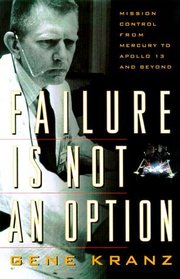Kevin L. (krlannan) reviewed Failure Is Not an Option : Mission Control from Mercury to Apollo 13 and Beyond on + 7 more book reviews
Well written account of the start of the space program by one who was there. Mr. Kranz casts an intimate eye on the events that shaped the beginning of man's exploration of space and what it was like to watch in all happen from the control room.
FAILURE IS NOT AN OPTION
Gene Kranz
You don't get much more eyewitness-to-history than Gene Kranz. As a member (later leader) of the Mission Control team for America's space program, Kranz participated in every Mercury, Gemini, and Apollo launch, from the humiliating failures of the early Mercury tests through the heart-pounding Apollo 13 journey, to the demoralizing end of our active participation in manned exploration of space.
Kranz has a straight-up style, and the book's only real flaw is that it may be overpacked with detail. In his attempt to ensure that every member of the ground and flight teams are acknowledged, and the technical details of the missions explained, there are a lot of names swimming around in the alphabet-soup of program acronyms.
The reader who can get through those gets a front-row seat to the missions, including descriptions of mission- (and life-) threatening glitches and problems solved on the fly. Most of the American public, even those of us who followed the flights with great interest, had no idea of problems that didn't rise to the Apollo-13 level of magnitude.
As the Apollo program itself draws to an end, the emotional impact of the book strikes a deep and troubling chord. Kranz does a bit of soap-boxing at the end, acknowledging the short-sightedness of allowing apathy and changes in political support to fritter away the momentum we had at the height of the program. It remains one of the most devastating events in human history that we, as a country, turned away from space exploration and research just as we had battered the door open.
The shuttle and space station missions are not within the purview of Kranz' book and so are not addressed. While undoubtedly providing valuable information, neither has the impact of the moon landings, and it's heartbreaking to recognize what we lost.
Kranz' viewpoint is a valuable part of the history of America's man-in-space program, and an enthralling read as well.
Gene Kranz
You don't get much more eyewitness-to-history than Gene Kranz. As a member (later leader) of the Mission Control team for America's space program, Kranz participated in every Mercury, Gemini, and Apollo launch, from the humiliating failures of the early Mercury tests through the heart-pounding Apollo 13 journey, to the demoralizing end of our active participation in manned exploration of space.
Kranz has a straight-up style, and the book's only real flaw is that it may be overpacked with detail. In his attempt to ensure that every member of the ground and flight teams are acknowledged, and the technical details of the missions explained, there are a lot of names swimming around in the alphabet-soup of program acronyms.
The reader who can get through those gets a front-row seat to the missions, including descriptions of mission- (and life-) threatening glitches and problems solved on the fly. Most of the American public, even those of us who followed the flights with great interest, had no idea of problems that didn't rise to the Apollo-13 level of magnitude.
As the Apollo program itself draws to an end, the emotional impact of the book strikes a deep and troubling chord. Kranz does a bit of soap-boxing at the end, acknowledging the short-sightedness of allowing apathy and changes in political support to fritter away the momentum we had at the height of the program. It remains one of the most devastating events in human history that we, as a country, turned away from space exploration and research just as we had battered the door open.
The shuttle and space station missions are not within the purview of Kranz' book and so are not addressed. While undoubtedly providing valuable information, neither has the impact of the moon landings, and it's heartbreaking to recognize what we lost.
Kranz' viewpoint is a valuable part of the history of America's man-in-space program, and an enthralling read as well.




